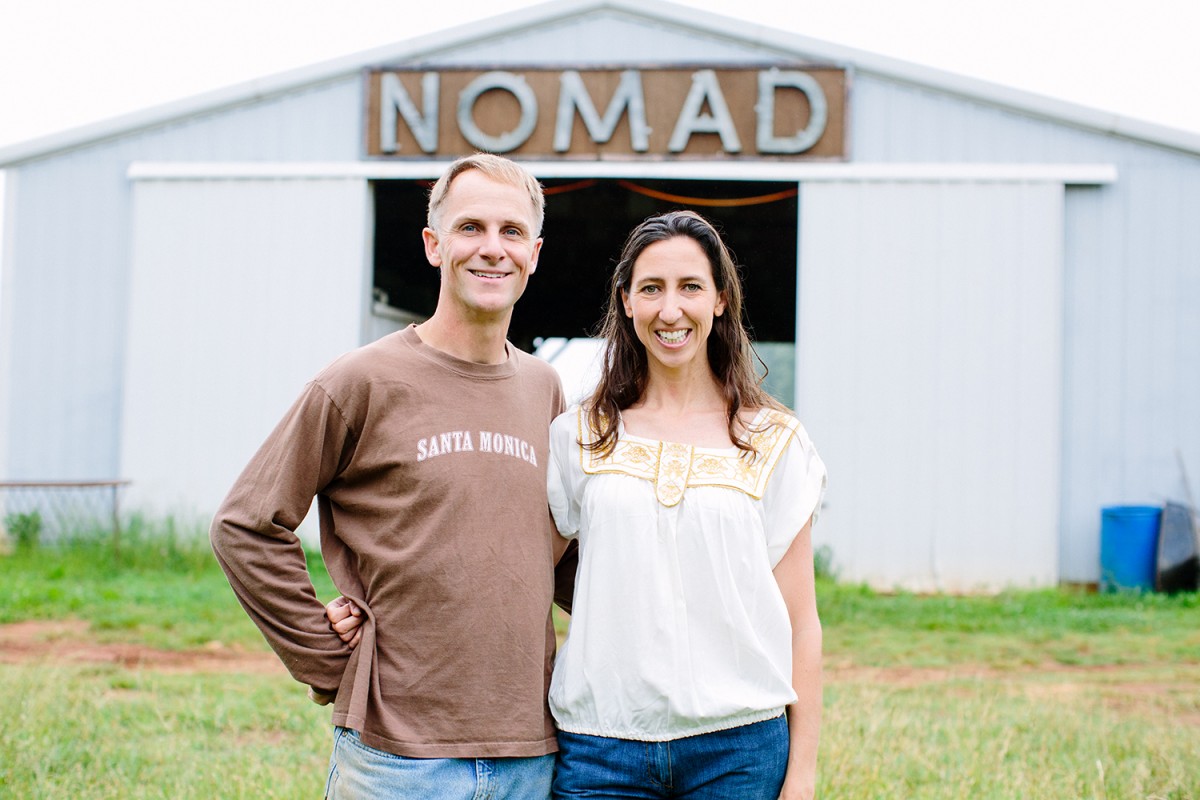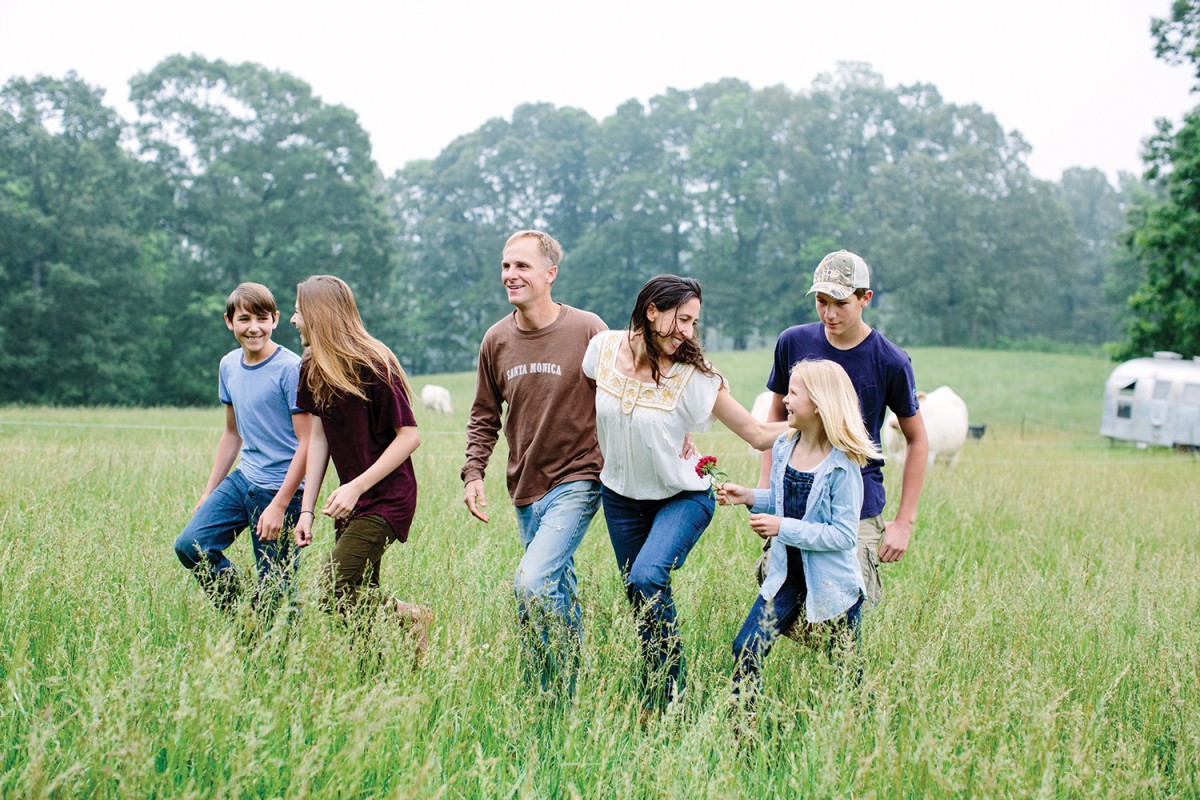From Tibet to Tobaccoville

A nomadic adventure halfway around the world leads a family to farming and back to North Carolina.
When Dana Reddick ’97 met Mark Nicholson ’97 on Franklin Street as freshmen, she was smitten — by Mark’s roommate.

Mark Nicholson ’97 and Dana Reddick Nicholson ’97, of NOMAD Farms in Tobaccoville, NC. Photo by Anna Routh Barzin ’07
But a week after graduating — she with a degree in education focusing on English, he in psychology — they were married, with the goal of raising a family and seeing the world while spreading the Christian gospel. With their path determined, the couple eventually set off with three young children for the Tibetan Plateau, a harsh landscape 11,000 feet above sea level, where at first they were barely able to communicate with the nomadic herdsmen.
The Nicholsons slept on dirt floors in their down coats, hauled buckets of water and had a fourth child. They stayed for 10 years.
For centuries, the nomads of the Tibetan Plateau have lived high above the tree line, following their herds of yaks and sheep from valley to valley, where the animals forage for fresh grass in a kind of natural crop rotation. The tribal, animal-centered way of life “seeped deep into who we are,” Dana said.
Neither came from a farming family — though Dana’s mother showed an entrepreneurial streak with several businesses, including a dance fitness program — but when they began thinking about how to translate life in Tibet into a life back in North Carolina, they thought that animals would be a big part of the answer. In Tibet, they experienced what has become known as the “Paleo diet,” based on what early humans are thought to have eaten, focusing on meat, fish, fruit and vegetables and excluding grains, dairy and sugars. They also saw animals being treated humanely, even to the moment of slaughter.
While still in Tibet, they went online and found a place back home that spoke to them: A 100-acre hilltop farm on rolling countryside northwest of Winston-Salem, in a spot named Tobaccoville. What they heard was, “Come turn these head-high weeds into pastures for cows, sheep, pigs and chickens.”
They bought the land with old college friends, Dr. Andy Geer ’97 (’02 DDS) and Lora Ponzi Geer ’97. Nearly three years and many 70-hour workweeks later, NOMAD Farms’ pastures are covered in thick grass. A refurbished log-and-beam tobacco barn serves as NOMAD’s retail store and marks, not coincidentally, the highest elevation in Forsyth County. The Nicholsons now live in a solar-powered farmhouse, unlike the tents used by their former neighbors in Tibet, but nomadic life is built into their business plan: All the animals stay on the move.

All four Nicholson children — here in the pasture with their parents — work on the farm: David, 13, far left, tends the sheep; Scottie, 14, runs the rabbit operation; Ellis, 11, at right, grows and cuts flowers for sale; and Bowen, 16, back right, oversees the chickens and pigs. Photo by Anna Routh Barzin ’07
The chickens live in rolling pens that protect them from predators. Every 12 hours, the humans move the pens forward one length so the chickens get fresh grass and bugs to eat, fertilizing the ground as they go. The sheep also live in rolling pens — just tall enough to keep coyotes from jumping in at night — shaded by a tarp or trees, eating new grass. The cows and pigs move from one fenced pasture to another every few days.
“Our farming method is ecologically interdependent,” Mark said. “Our chickens fertilize the grass, then the cows come through and eat the grass. Then laying hens come in and scratch the cow pies looking for bugs, spreading the manure back into the soil naturally. More than anything, we’re grass farmers. We’re converting solar energy into biomass.” They don’t use hormones, antibiotics or genetically modified products.
Not everyone understands the concept. Soon after the Nicholsons arrived, some well-meaning farmers gave them advice. “You should cut down all these trees so you can get bigger equipment in here to spray the fields; it’ll be a lot more efficient.” The Nicholsons politely declined.
The couple always wanted education to be a part of the operation, so they offer summer camps and farm tours. Once a few parents discovered NOMAD Farms and posted photos on Facebook, it became more a question of crowd control and ecosystem management than of finding customers, even at NOMAD’s higher-than-typical-grocery prices. Raising food this way inherently means extra costs. A NOMAD chicken sells for $19 whole, $24 butchered; ground beef is $9 a pound, pork chops $10 a pound.
Mark looks at it this way: “You pay for your health now, in the form of clean food, or you pay later, in the form of doctor bills.”
— Ann Loftin

Watch an NC Weekend segment on NOMAD Farms from UNC-TV.
Thanks for reading the Carolina Alumni Review
Carolina Alumni members, sign in to continue reading.
Not yet a member? Become one today.





